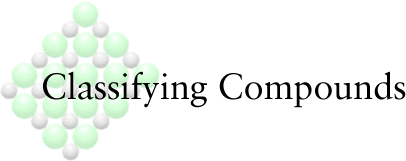
Home
Common Compounds
Exam Guide
FAQ
Features
Glossary
Construction Kits
Companion Notes
Just Ask Antoine!
Simulations
Slide Index
Toolbox
Tutorial Index
Companion Notes
Introduction
Measurement
Matter
Atoms & ions
| Compounds |
 Classify compounds Classify compounds |
 Interpret formulas Interpret formulas |
The mole
Gases
Energy & change
The quantum theory
Electrons in atoms
The periodic table
Home  Companion Notes Companion Notes  Compounds Compounds | Print | Comment |

Why learn to classify compounds? Millions of chemical compounds are known. Just as biologists group plants and animals to show their fundamental similarities, chemists group compounds to show patterns and trends in chemical properties. These groupings help chemists understand how a material's molecular structure determines its chemical and physical properties. Learning to classify compounds will help you see some underlying order in the hundreds of compounds you're likely to encounter in general chemistry.
How is compound classification used? Each class of compounds has a chemical naming scheme that allows the compound's complete structure and formula to be worked out from its name. In order to learn and use these chemical names you'll have to learn which class a compound belongs in. You will also find compound classification useful in devising methods for separating mixtures and for choosing solvents.
How are compounds classified? These pages outline some of the more useful schemes for classifying most common compounds.
- Classify by building block. Some compounds are built from ions
 ;
others are made of molecules
;
others are made of molecules .
.
- Classify by acidity. Bases
 capture hydrogen ions;
acids
capture hydrogen ions;
acids release them.
release them.
- Classify by carbon content. Organic
 compounds contain chemically bound carbon and hydrogen;
inorganic
compounds contain chemically bound carbon and hydrogen;
inorganic compounds don't.
compounds don't.
- Classify by polarity. Polar
 compounds are usually soluble in solvents like water; nonpolar compounds aren't.
compounds are usually soluble in solvents like water; nonpolar compounds aren't.
- Classify by electrical conductivity Solutions of electrolytes conduct electricity; nonelectrolytes don't.
newsletter describing updates,
new features, and changes
on this site.
General Chemistry Online! Classifying compounds
Copyright © 1997-2005 by Fred Senese
Comments & questions to fsenese@frostburg.edu
Last Revised 02/23/18.URL: http://antoine.frostburg.edu/chem/senese/101/compounds/compound-classify.shtml